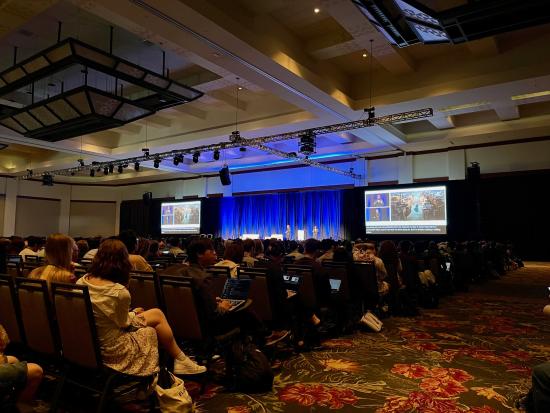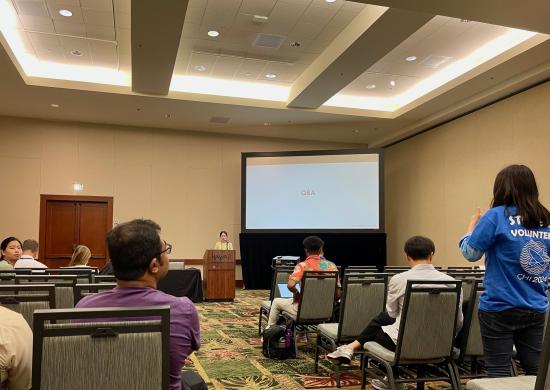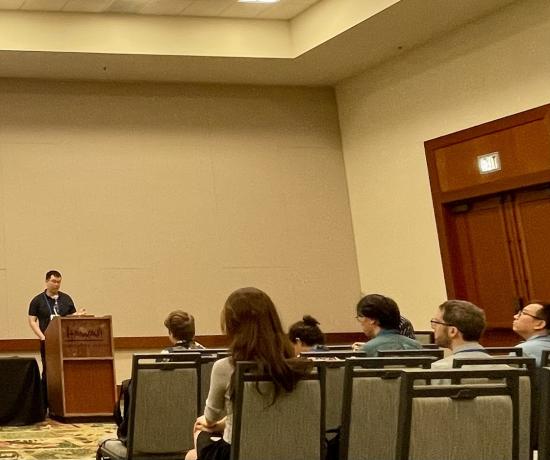Ten faculty, students, and alumni from the School of Information presented their research at this year’s CHI conference in Honolulu, Hawaii.
The 2024 CHI conference ran from May 11 to May 16 and included presenters from organizations such as Google, the Association for Computing Machinery, and Apple along with scholars from the world’s leading universities. This year’s theme, “Surfing the World,” reflected the focus on pushing forth the wave of cutting-edge technology and riding the tide of new developments in human-computer interaction.
Presentations for journals and papers were pre-recorded this year for digital access.
A Playbook to be Proud of: Making the Case for LGBTQ+ Inclusive User Account Design
Assistant Professor Morgan Ames, MIMS alums Beatrice Fadrigon, Princess Gordon, and Jane Lupica (all ’23)
Digital platforms often require users to select from a limited set of options that may force them to misrepresent their gender identities and sexual orientation, which disproportionately affects the LGBTQ+ population. To provide digital product teams with a feasible industry-focused tool to ensure the inclusion of this population, the team surveyed 151 participants, including 81 who identify as LGBTQ+; conducted interviews; and analyzed the user account creation processes of 45 digital platforms commonly used or mentioned in survey responses to understand LGBTQ+ users’ wants, needs, and pain points in navigating user account sign-up. Based on these results, the team presented a ‘Playbook’ of design recommendations.
Perceptions of Fairness in Technology-Mediated Marketplaces
Professor Coye Cheshire, Ph.D. students Ji Su Yoo and Andrew Chong
Consumers increasingly interact with workers through technology-mediated marketplaces (TMMs)—environments where third-party companies manage interactions, control information, and constrain behavioral choices. The team argues that opacity in how TMMs operate can make it difficult for consumers to judge what is fair when interacting with other economic actors. To better understand how consumers perceive and act on fairness in TMMs, they examine the practice of tipping—a consumer behavior in the United States that is strongly associated with assessments of fairness.
PaperPlain: Making Medical Research Papers Approachable to Healthcare Consumers with Natural Language Processing
Professor Marti Hearst, Tal August, Lucy Lu Wang, Jonathan Bragg, and Kyle Lo
When seeking information not covered in patient-friendly documents, healthcare consumers may turn to the research literature. Reading medical papers, however, can be a challenging experience. To improve access to medical papers, the team introduced a novel interactive interface — Paper Plain — with four features enabled by natural language processing: definitions of unfamiliar terms, in-situ plain language section summaries, a collection of key questions that guides readers to answering passages, and plain language summaries of those passages.
(Beyond) Reasonable Doubt: Challenges that Public Defenders Face in Scrutinizing AI in Court
Assistant Professor Niloufar Salehi and Angela Jin
Accountable use of AI systems in high-stakes settings relies on making systems contestable. In this paper, the team studied efforts to contest AI systems in practice by studying how public defenders scrutinize AI in court. They present findings from interviews with 17 people in the U.S. public defense community to understand their perceptions of and experiences scrutinizing computational forensic software (CFS), and probabilistic genotyping tools. They also provide recommendations that center the technical, social, and institutional context to better position interventions such as performance evaluations to support contestability in practice.
Addressing Interpersonal Harm in Online Gaming Communities: The Opportunities and Challenges for a Restorative Justice Approach
Assistant Professor Niloufar Salehi, Sijia Xiao (Ph.D. ’24), and Shagun Jhaver
Most social media platforms implement content moderation to address interpersonal harms such as harassment. Content moderation relies on offender-centered, punitive approaches, e.g., bans and content removal. The team interviewed users from the Overwatch gaming communities, where nearly three quarters of all online game players suffer from some form of online abuse to study how the communities currently handle harm cases through the lens of restorative justice and examine their attitudes toward implementing restorative justice processes.
“It was an incredible week at CHI 2024 reconnecting with friends and colleagues in a ridiculously beautiful location in Honolulu,” said Professor Coye Cheshire. “Great talks and panels every day, and a long list of human-computer interaction papers that I can’t wait to read. The highlight of my week was catching the excellent talks by two of my Ph.D. students, Andrew Chong and Sijia Xiao.”













